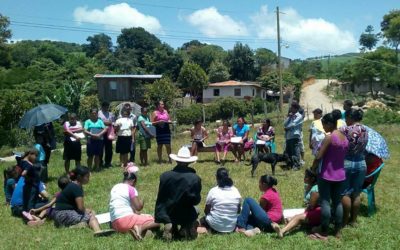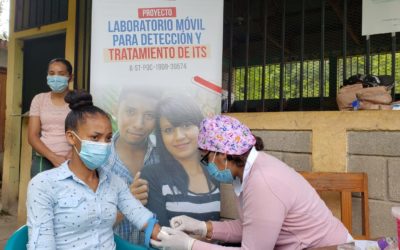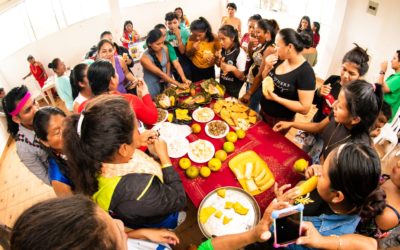Online training is 80% subsidized by the FdW and has contributions from international experts and specialists within the framework of the Training Program for Mediators in Prevention of deficiencies and prenatal and postnatal diseases. It arises in response to the situation caused by the pandemic and seeks a transition and alternatives to take care of the well-being of the mother and her baby.
Among the reflections raised by the health emergency, due to the COVID-19 pandemic, it is clear that prevention is one of the fundamental tools to avoid crises such as the one humanity is currently facing. For more than 35 years, the De Waal Foundation (FdW) has focused its work on building a culture of prevention of diseases and deficiencies in unborn babies, which can cause disabilities in infants.
One of the strategies we use to fulfill this objective is the training of mediators and promoters, who obtain the knowledge and skills necessary to intervene as agents of change in the stages that we have described. Throughout this time, the Foundation has trained more than 40 thousand people, which has allowed us to accumulate important experiences with our own model, pedagogical mediation and the use of virtual classrooms.
In this context and with the declaration of the COVID-19 pandemic, the FdW has responded agilely to the current health situation, in which pregnancy planning, pregnant women, unborn babies, newborns and children of up to two years of life, they are in a highly vulnerable situation. The International Course “Prevention and Promotion of Maternal and Child Health in times of COVID-19” It was designed by technical teams, experts and monitors from the countries in which the Foundation works: Bolivia, Ecuador, El Salvador and Honduras, to provide updated knowledge, in the midst of this new scenario.
In pre-pandemic conditions, at least 50% of preterm birth cases could be prevented if intervened before conception, according to the report. Born Too Soon, prepared by the World Health Organization (WHO) and the March of Dimes. However, in the current situation, health and education services are seriously compromised due to this disease and its consequences. Impacts that, furthermore, continue to be generated, in the midst of a developing crisis. For example, at the beginning of the world emergency declaration, the WHO considered that pregnant women had the same risk of suffering complications as the rest of the population infected by the coronavirus. But, more than six months after the global emergency was declared, it has been determined that the danger is greater for pregnant women with COVID-19. Thus, the Centers for Disease Control and Prevention (CDC, for its acronym in English) recently established that pregnant women may have a greater risk of becoming seriously ill from COVID-19 than those who are not pregnant. and have tested positive for this disease. In addition, pregnant women infected with COVID-19 may have a higher risk of suffering preterm birth.
Marco Vernooij, director of Latin America of the FdW, emphasizes that in the midst of the pandemic, “prevention is the only measure we have. It is essential to find ways to define much more resilient prevention structures, so that in the future we will not have to face situations like the one that is currently occurring. For this reason, the experience that the Foundation has with its instruments is extremely important to highlight the factors that influence maternal and child health and now specifically when treating the necessary measures for pregnant women and children, up to the first two years of life. in the middle of COVID-19. The set of topics addressed by the International Course is very relevant in the current situation ”.
The course has contributions from international experts and specialists in the framework of the Foundation’s Training Program for Mediators in Prevention of deficiencies and prenatal and postnatal diseases. Sebastián Salgado, project manager of the FdW, details the particularities of this new course, which will bring together participants from various nations, unlike previous courses, which were worked on separately by country. “This modality will allow us to know the different views and experiences of the monitors and the participants about the reality they are living. It is an online training, the virtual classroom with which we have already had in previous courses, will be further enriched. We have a techno-pedagogical model COI (Community of Inquiry), with prosumers, that is, participants who learn in an interactive environment and generate information to promote prevention. These learnings are transmitted first with a diagnosis of the population of reproductive age and later with directed actions such as virtual home visits, digital health fairs, among others. “
The course contains seven units of study. The duration is eight weeks, with a workload of 100 academic hours. The contents that it will address are:
Introduction and Methodology,
Basic Principles of Epidemiology, Similar Viruses and SARS-Cov-2,
Covid-19 and pregnancy,
Considerations for Delivery and the Neonatal Phase,
Early childhood,
Sexual Reproductive Health during the health crisis
The Ecohealth approach and Building a culture of prevention.
On this last issue, the Director of Latin America of the FdW, explains that the concept of Ecosalud analyzes how a society is organized, from its economic, social, environmental, health conditions and its link with the construction of a culture of prevention in the one on which the Foundation’s work is based.
“The pandemic is showing the need for preventive health and as almost no state or society has included it on the public agenda. Currently it is difficult to find resources or spaces for quality prevention. And this crisis is showing us the need to have a culture of prevention and healthy habits in the entire population, as well as prepared and equipped health systems ”, adds Sebastián Salgado.
Following this line, Marco Vernooij cites the current annual report of the WHO Global Preparedness Monitoring Board “A World in Disorder ”, which warns of the urgency and importance of global preparation for the next health crisis. Investing in knowledge and resources are two fundamental aspects. “With $ 5 of prevention, invested per person, we can avoid the next pandemic,” he points out.
At the end of the International Course “Prevention and Promotion of Maternal and Child Health in times of COVID-19”, participants will receive a certificate awarded by the Gabriel René Moreno Autonomous University . Another aspect to highlight is the cost of this training, which has a value of $ 40, for those who are mediators trained by the FdW, and $ 55, for those who take the course for the first time. “This is a very convenient price, given the scope of knowledge that will be acquired and the team of professionals and experts who have developed the material to be shared,” explain the representatives of the FdW.
Those interested in being part of this course can register at this link: https://fundaciondewaal.org/index.php/postulacion-curso-internacional/ . Space is limited. The training will start in the next few weeks.



